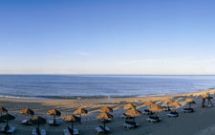Vila Franca de Xira
Vila Franca de Xira
Towns and Villages
On the bank of the River Tagus, Vila Franca de Xira is surrounded by fertile plains - the lezírias (alluvial plains), where the campinos (Ribatejo cowboys) keep constsnt watch on the horses and bulls that are bred there. Vila Franca de Xira is famous for the unswerving loyalty of the fans of the bullfight, the favourite entertainment in the region, which takes place between April and October almost every weekend in the Palha Blanco Praça de Touros (bullring). For those interest in this, an absolute must is a visit to the Ethnographic Museum in the Praça de Touros, and to the stud farms and equestrian centres of the Lezíria Grande and the Morgado Lusitano.
The bullfights and running of the bulls in the streets are also an essential feature of the main festivals of the region, such as the October Fair and the Festival of the Colete Encarnado (Scarlet Waistcoat), which is held every year in June and owes its name to one of the components of the campino's (Ribatejo cowboy`s) costume.
Some of the most important dishes in the varied cuisine are typical riverside dishes, such as eels, dabs, açorda de savel (purée of bread, herbs and garlic with shad), galinha de cabidela (chicken with giblets, cooked in its own blood and with rice), mutton stew and tripe cooked in the Vila Franca style.
In Alverca, the Museu do Ar, the only one in the country, has a collection of objects that illustrate the history of aeronautics in Portugal.
In the environs, the Nature Reserve of the Tagus Estuary is the stopping-point for migratory birds - flamingoes, storks, sandpipers, avocets, duck, kites and kestrels. In the rural hinterland, life is peaceful, the environment unpolluted, and the main occupation is smallholder farming.
The bullfights and running of the bulls in the streets are also an essential feature of the main festivals of the region, such as the October Fair and the Festival of the Colete Encarnado (Scarlet Waistcoat), which is held every year in June and owes its name to one of the components of the campino's (Ribatejo cowboy`s) costume.
Some of the most important dishes in the varied cuisine are typical riverside dishes, such as eels, dabs, açorda de savel (purée of bread, herbs and garlic with shad), galinha de cabidela (chicken with giblets, cooked in its own blood and with rice), mutton stew and tripe cooked in the Vila Franca style.
In Alverca, the Museu do Ar, the only one in the country, has a collection of objects that illustrate the history of aeronautics in Portugal.
In the environs, the Nature Reserve of the Tagus Estuary is the stopping-point for migratory birds - flamingoes, storks, sandpipers, avocets, duck, kites and kestrels. In the rural hinterland, life is peaceful, the environment unpolluted, and the main occupation is smallholder farming.




 Explore
Explore 
 Remember and Share
Remember and Share 


